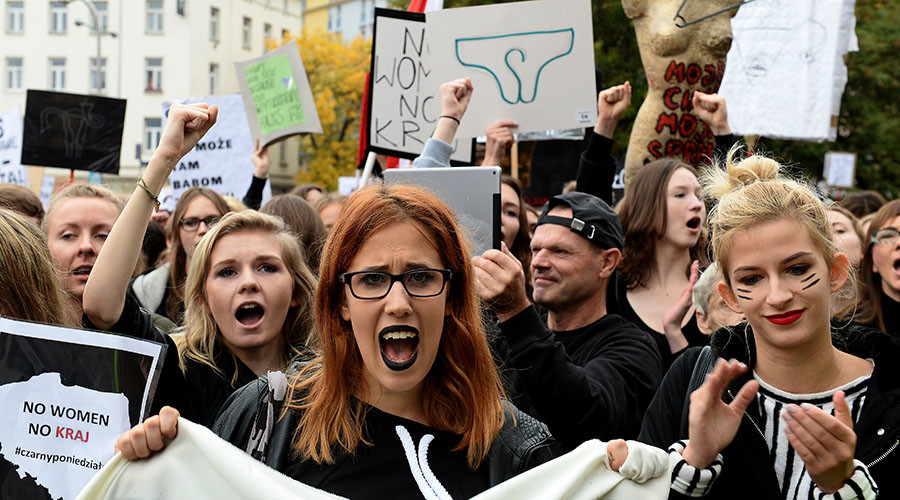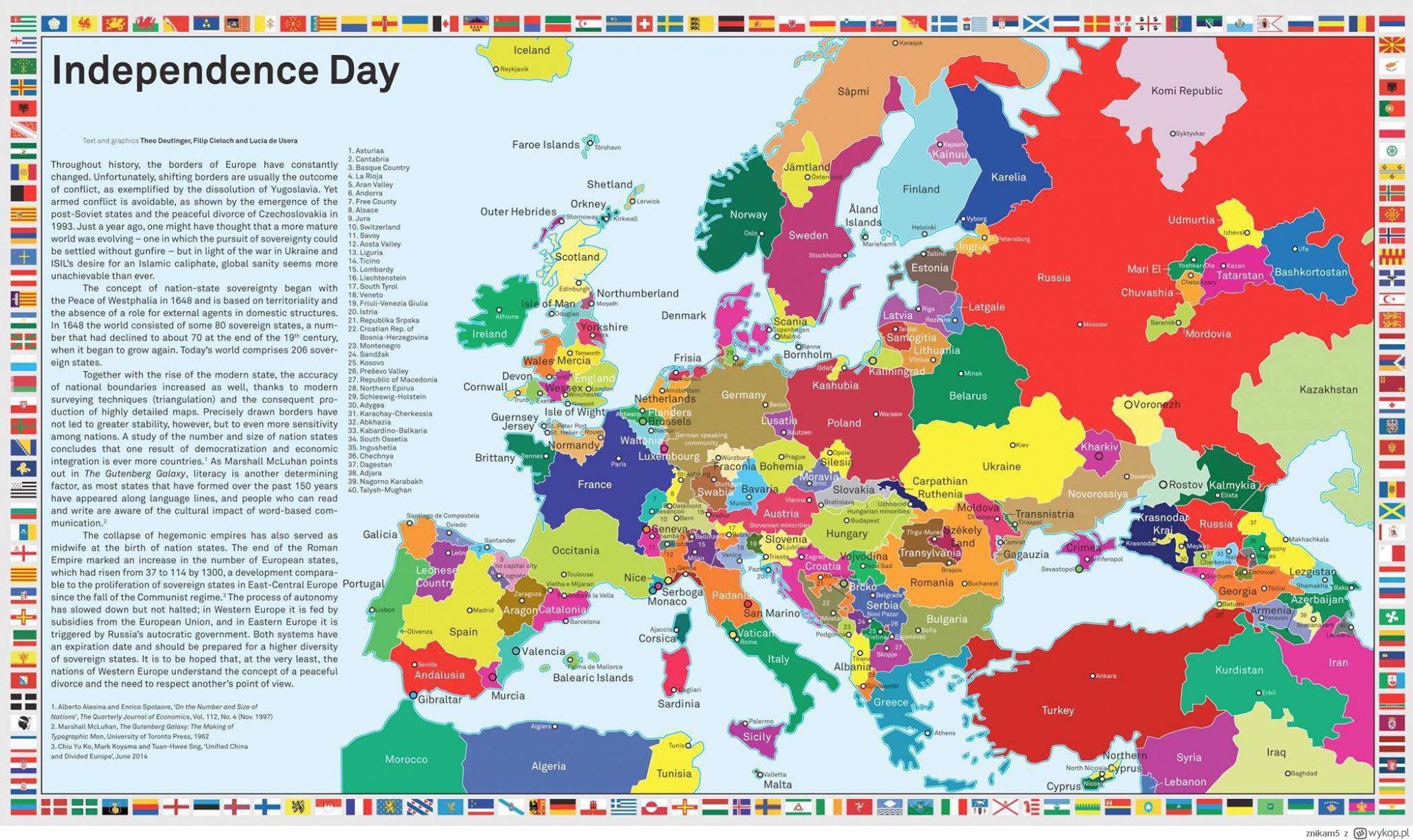The Western press has recently departed from its usual practice of ignoring the political developments occurring this year in Poland and instead dedicated much time and ink in decrying the allegedly retrograde steps taken by its national-conservative government. This sudden interest is mostly because the “wrong side” won the last Presidential and Parliamentary elections, and also because that side has rejected the former government’s slavish obedience to the Brussels behemoth. Such a course cannot go uncommented, unchallenged and unlibeled.
In the past week, the country was embroiled in a controversy over proposed legislative reforms that would tighten the already existing laws against abortion. The Western media of course characterised this as the latest attempt of a populist government in a staunchly Catholic country to enforce conservative religious morality through its law. But what the media didn’t report illuminates just what really has happened in this Central European country. Sławomir Skiba of the monthly Polonia Christiana explains where the proposed reform came from (here’s a hint: it wasn’t a government initiative at all) just what happened to the law, and why. The short report is provided courtesy of Valdis Grinsteins, who is a friend of the Sydney Traditionalist Forum. We reproduce it here to allow fellow-travelers in the Anglosphere to understand this allegedly embarrassing setback in European conservative politics.
The truth about the rejection of the anti-abortion bill in Poland. The voice of the bishops was decisive.
We are surprised to hear about reports appearing in the Western media about the alleged defeat of the governing “Law and Justice” party and the Polish Bishops in the battle for a complete ban on abortion in Poland.
Such claims call for a categorical rectification, because the truth is not reflected in the narrative being promoted by Western journalists! The proposed bill to ban abortion, which was signed by more than half a million Poles, was rejected in Parliament by the votes of the Law and Justice party. This occurred because the Bishops themselves did not object to the Bill’s rejection.
In light of the information appearing in some Western media outlets, we want to set the record straight. The facts are as follows:
Firstly, the Polish Parliament proceeded with the civic bill calling for total protection of life from conception to natural death. This was not a bill authored by Law and Justice, but a result of popular initiative, prepared by Catholics representing NGO’s in the “Stop Abortion” Committee.
Secondly, the bill was accepted in the first stage of the legislative process by Law and Justice MP’s, who promised to debate every popular initiative (this position was taken to differentiate them from their predecessors). In the meantime, Law and Justice MP’s spoke very warmly about the initiative, categorically declaring themselves to be fully pro-life on account of being Catholic.
Thirdly, demonstrations erupted in Poland and evidently frightened the government. Despite the fact that these demonstrations were organized by people and organizations that have always been hostile towards Law and Justice and generally towards the Polish Right and the Church, the politicians of the ruling party nevertheless became fearful of the political outcome of these protests. This course of action was taken despite the fact that more numerous and larger opposition protests, which have taken place in Poland during the course of the last year, were confronted by the government with a cool head and stoic attitude.
Fourthly, the protests of the feminists forced Law and Justice to convene in a hastily and embarrassing manner an arguably illegal session of a Parliamentary committee and recommend the rejection of the popular initiative to the Sejm (the Lower House). That same day – and this must be especially emphasized – the Polish Episcopal Conference issued a surprising document, in which it opposed the pro-life reform, because it mandated the punishing of all those persons responsible for conducting an abortion, including women who allow their children to be killed.
Fifthly, the Law and Justice government rejected the popular initiative by a crushing majority in the second stage of the legislative process (in the Polish Sejm legislative process is divided into 3 stages) effectively blocking any substantive discussion concerning the Bill and the posing of questions. The authors of the bill (i.e. the Catholics in the aforementioned NGO’s) were informed that a discussion on the bill would take place just a few hours before the committee meeting and before the final vote, despite the fact that the rules of the Sejm require that this happen three days in advance. As a result, some of the representatives of the authors of the Bill did not make on time to the Sejm.
Sixthly, throughout the duration of the controversy, certain Law and Justice politicians would declare their discomfort with the notion of punishing women, which was stipulated under the Bill. Despite having the means to simply expunge this section of the Bill and continue to work on it without the penal consequences for women who decide to kill their children, they refrained from doing this. This reflected the position of the Polish Bishops who on the same day decided to reject the Bill in its entirety. The Sejm rejected the popular initiative. Out of 460 MP’s, barely 50 voted for the bill.
Seventhly, Law and Justice MP’s who all of a sudden changed their position made references to the decision of the Bishops. Krystyna Pawłowicz wrote openly on her Facebook page that “it was the Episcopate that authorized us to do this”.
These facts, which were and remain in the public domain, irrefutably show that talk of a “setback for Law and Justice and the Bishops” is an intentional lie. The politicians of the ruling party and members of the government are not unhappy with the outcome of this controversy. The day after the Bill’s rejection they issued a communique in which they state that “the full protection of life from conception to natural death” should continue to be the aim. This communique was issued a few hours after the first statement of the Bishops, which they took at face value, whereby they rejected the popular initiative for the complete defense of the unborn.
Sławomir Skiba
Polonia Christiana
The above text has been edited in part for the sake of clarity.
As an interesting side-note, consider the symbolism and slogans used by the pro-abrotion protesters in Poland. Organisers used Ireland as a model and took black umbrellas and black fags to the street. It is amazing that the irony did not strike them that proponents of abortion were displaying the flag and colours of death. Likewise, consider the feature image in this post. The slogan states that without women there is no country. Quite true, but why? Because without women there are no babies. Yet here we have women marching in support of abortion. The only logical interpretation is that these women want there to be no country. Secular feminism has once again proven itself to be the ideology of collective national suicide.
– SydneyTrads Editors





“the Polish Episcopal Conference issued a surprising document, in which it opposed the pro-life reform, because it mandated the punishing of all those persons responsible for conducting an abortion, including women who allow their children to be killed.”
Oh, by the Saints you have got to be FFFFreaking kidding me! Why does everyone have to be such a ludicrously stupid sop to women of all people? One step from abolishing child murder, and our own *bishops* condemn a measure because it punishes accessories to murder for the crime that they commit! The Episcopal Conference Waltz: one step sideways, two steps back!